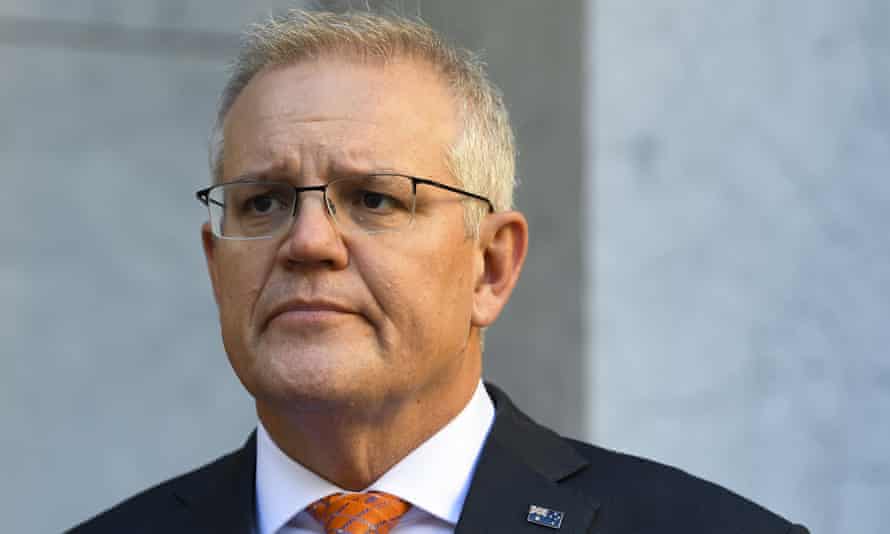Extract from The Guardian

Last modified on Sat 14 Aug 2021 15.52 AEST
With Covid-19 cases mounting because of the winter Delta outbreak, Australians are acutely aware of the public health perils of vaccine hesitancy. But this week, Australians were subjected to a different kind of equivocation: governing hesitancy.
Barnaby Joyce gave us the starkest examples. Australia’s deputy prime minister told the ABC on Wednesday governments don’t formulate climate policy, and he couldn’t possibly share what his own position might be until a “competent” authority, possibly the CSIRO or the Intergovernmental Panel on Climate Change, told him what to do.
This honesty binge continued the next day, when Joyce returned to the ABC to say he didn’t agree with his colleague George Christensen’s public campaign against lockdowns, but he didn’t intend to pull him into line either, because that might trigger a byelection. Joyce noted the Coalition governed with a “thin margin” and if you “start prodding the bear, you’re going to make the situation worse”.
Joyce’s perplexing reluctance to lead, having returned to the position of Nationals leader (hint is in the title) begs a blindingly obvious question: why didn’t he stay on the backbench?
If the Nationals leader doesn’t feel competent to make decisions law-makers are called to make, like whether Australia needs to finally manage the risks of global heating after buggering that up for more than a decade, or whether consistency in public health messaging matters during a pandemic, why doesn’t he make way for someone who is competent?
Australia’s deputy prime minister floods the zone with feelings, and that can be confounding for fact-checkers. But leadership isn’t just a title and a salary. It carries a clear set of obligations that were non-negotiable last time I checked, even in an era where populists are sometimes cynical enough to actively foment distrust in institutions from the comfort of the institutions they happily occupy.
Threaded through Joyce’s profiles in pandemic courage this week was a discussion about vaccinations, and whether or not they should be mandatory for high-risk workers.
Australia is mulling these conundrums now because we’ve reached the point where people are beginning to realise the crisis we are living through doesn’t have a definitive endpoint.
This threat will retreat in stages. Vaccination rates will increase (and fortunately the strollout is picking up velocity now). That helps. But living with a dangerous virus requires rules and social contracts formulated to save lives and livelihoods – assuming that remains Australia’s shared objective.
Given that’s the national epiphany, frustration has been building up among the freedom lovers of the centre-right. Philosophical divisions in Gladys Berejiklian’s government have been very obvious during this current lockdown, and the political atmosphere has also become significantly more fraught for Scott Morrison. Last weekend, I mapped the fault line reopening in centre-right politics prompted by Delta outbreaks plunging millions of people back into lockdown.
Roll on a few weeks, authorities say deliberate non-compliance is a significant problem in Sydney. In the world of politics, we can also plot the component parts of Morrison’s still developing “shit show”. Last weekend, the former Queensland premier Campbell Newman bagged “heavy-handed” measures destroying people’s “livelihoods, jobs and freedoms” and flagged a Senate run for the Liberal Democrats.
Sensing an on-brand scrap, Pauline Hanson perked right up this week – and with the deputy prime minister signalling he had no intention of asking for internal discipline, George Christensen got out the loud hailer on lockdowns, and Matt Canavan argued when it came to mandates, the “default should be in favour of personal freedom”.
People with good memories will recall Morrison hit political headwinds a little while back both internally and externally when he floated the idea of a vaccine passport – even though polling suggests a majority of Australians support the idea – and it seems obvious that’s where things will land.
After this Friday’s national cabinet meeting, Morrison delicately referenced the subject, noting leaders had discussed “exemption arrangements for vaccinated persons in Australia” (which sounds a lot nicer than rules to stop unvaccinated people travelling). He stressed there were “no decisions”.
Pressed further on whether vaccination may end up being a requirement for interstate travel, Morrison eased around the sticky paper by arguing the objective of getting to 70% and 80% vaccination rates was to end border restrictions, so the point was moot.

Then there’s the debate about whether or not vaccinations should be compulsory for workers. Obviously making a vaccine compulsory is a significant step. Personal freedom is a central tenet of any democracy worthy of the label, and because I value freedom, my natural default is persuasion rather than compulsion.
But there are actually competing freedoms for governments to balance: namely, the freedom for people to choose not to have a vaccination that might save their life, and the freedom for citizens to be safe from the harm caused by the more laissez-faire inclinations of others.
But as the debate around mandatory vaccinations becomes a fully-fledged freedom proxy, and the conversation gets politically hotter as actors on the centre-right compete more theatrically for the attention of voters who don’t trust governments or institutions, Morrison is creeping away from his own interventionist instinct.
After Friday’s national cabinet meeting, Morrison found himself, rhetorically, uncomfortably astride the barbed wire fence. The same prime minister who mandated vaccinations for aged care workers in full view of the Australian public declared he was absolutely not a mandator (except when he was, but that was different, and that was OK).
Just so we are clear. Major business groups have asked the government to do two things: show some leadership in nominating specific sectors where mandatory vaccinations are desirable for public health objectives; and potentially indemnify employers in the event they, with government backing, impose compulsory vaccinations, and God forbid, an employee suffers an adverse reaction.
This is the same principle as indemnifying general practitioners and pharmacists who administer Covid vaccinations (which the Morrison government already does).
But on Friday, Morrison (who very obviously wants to avoid any appearance of compulsion by “stealth” – a damaging trope that will fuel fresh Facebook conspiracies) actually flagged the opposite issue.
The prime minister flagged protecting businesses that might face legal action for not mandating vaccinations.
In foreshadowing this protection for the non-mandators, Morrison noted it was “not reasonable that an employer may feel they have to put some sort of mandate in place to protect themselves potentially from [the reach of] some health and safety laws”.
Fair enough. But Morrison was stone cold silent on the other equally pertinent question: is it reasonable that employers mandating vaccinations to protect their workers and the broader public then face the risk of legal action?
Tracking back to where we started, with this strange phenomenon of late pandemic governing hesitancy – the mixed messaging on Friday evening was unfortunate.
Morrison looked like a prime minister more minutely focused on managing the appearance of his own logical contradictions than grappling with the complex needs of the moment.
No comments:
Post a Comment